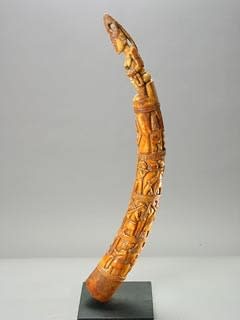Yoruba Ivory Oliphant, 18th Century CE - 19th Century CE
Ivory
32
PF.6187 (LSO)
This superbly detailed oliphant was made by the Yoruba of Nigeria. It is a very substantial piece, at almost three feet long, demonstrating the tusk’s original curve. The body of...
This superbly detailed oliphant was made by the Yoruba of Nigeria. It is a very substantial piece, at almost three feet long, demonstrating the tusk’s original curve. The body of the tusk is decorated with four bands of decoration featuring processional scenes. Admirers raise their arms, warriors and villagers arrive carrying offerings including a freshly hunted animal, vessels and other items. Cooks tend to a large pot, preparing a feast. The apex (tip) of the tusk is decorated with a high-relief finial in the form of a seated woman with a child on her knee. She wears a highly ornate headdress in the form of a pangolin, and is further adorned with jewellery around upper arms, wrists and ankles. Speculatively, the activities of the figures on the main tusk are focused towards the queen (?) on the finial.
The Yoruba peoples of Nigeria have what is probably the longest extant artistic tradition in Africa. The nation state is comprised of numerous subsections that were joined historically by the rise and collapse of the Ife (12th to 15th centuries) and Benin (13th to 19th centuries) polities. Each of the sub-kingdoms – including Oyo, Ijebu and smaller units towards the west – had their heyday, and are loosely united through language and culture, although they still retain a measure of independence in terms of artistic tradition. It is extremely hard to summarise the nature of Yoruba society given the variability of their customs.
The Yoruba are sedentary, agriculturist and hierarchical. They are ruled by hereditary kings known as Obas, and their access to the supernatural world is supervised by a very complex arrangement of priests (i.e. Olowa) and spiritual intermediaries. They also have a deeply established aristocracy and social order, which is reflected in Yoruba artworks. Yoruba craftsmen went to great lengths to honour those in authority, partly as a devotional device and partly for social advancement. This is most likely to represent a queen, and was one of two tusks which were – and indeed still are – used to frame the Oba’s throne on ceremonial occasions. Their social value is astronomical – ivory was deemed to be more valuable than gold, and was the royal family’s preferred raw material.
This is a truly impressive piece of African art.
The Yoruba peoples of Nigeria have what is probably the longest extant artistic tradition in Africa. The nation state is comprised of numerous subsections that were joined historically by the rise and collapse of the Ife (12th to 15th centuries) and Benin (13th to 19th centuries) polities. Each of the sub-kingdoms – including Oyo, Ijebu and smaller units towards the west – had their heyday, and are loosely united through language and culture, although they still retain a measure of independence in terms of artistic tradition. It is extremely hard to summarise the nature of Yoruba society given the variability of their customs.
The Yoruba are sedentary, agriculturist and hierarchical. They are ruled by hereditary kings known as Obas, and their access to the supernatural world is supervised by a very complex arrangement of priests (i.e. Olowa) and spiritual intermediaries. They also have a deeply established aristocracy and social order, which is reflected in Yoruba artworks. Yoruba craftsmen went to great lengths to honour those in authority, partly as a devotional device and partly for social advancement. This is most likely to represent a queen, and was one of two tusks which were – and indeed still are – used to frame the Oba’s throne on ceremonial occasions. Their social value is astronomical – ivory was deemed to be more valuable than gold, and was the royal family’s preferred raw material.
This is a truly impressive piece of African art.
